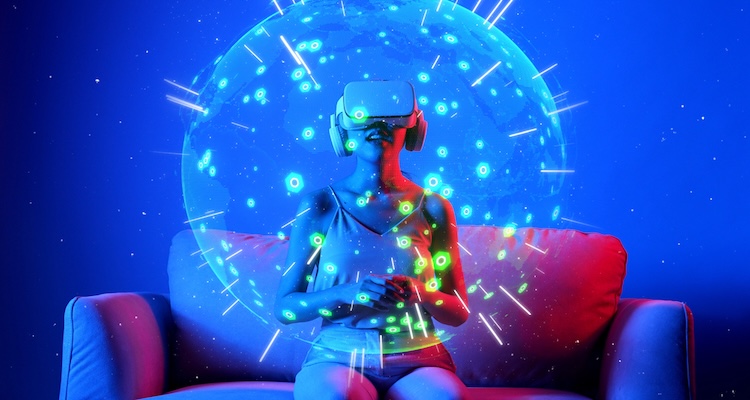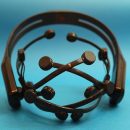Tripping the Erotic Fantastic: Could Hallucinogens Make Our Artificial Companions More Lifelike?
Rather than rewriting their code, let’s consider altering our minds instead

When it comes to artificial companions—whether physical sexbots or the digital variety—the ultimate goal clearly seems to be to make them as realistic as possible, to the point where they will be practically indistinguishable from the people designing and manufacturing them.
The problem is that while the industry continues to make impressive strides toward this, the reality is we’re anywhere from a couple of decades to perhaps even as long as half a century away from producing anything remotely close to passing for human.
But here’s an admittedly radical thought: as an alternative to putting so much time, effort, energy, and money into chasing that frustratingly elusive dream, why not pharmacologically modify our consciousnesses so that what was previously anything-but-lifelike would now appear, feel, and, to all intents and purposes, be another fully realized person?
Eight Miles High
Mere fanciful speculation? Far from it. As Futurism recently reported, a growing number of psychedelic users are not only using artificial intelligence systems like ChatGPT as “trip sitters,” but are also helping to foster the creation of specifically tailored versions such as The Shaman or TripSitAI.
Sharing his experiences with Technology Review, Peter recalled having a profoundly moving psilocybin experience—made notably better by his ChatGPT guide, which played soothing music while offering calming reassurances when necessary.
RECOMMENDED READ: Artificial Companion Designers: Time To Think Beyond Just Sex?
Futurism rightfully points out that the merging of psychedelics and AI isn’t without potentially tragic repercussions—considering large language models’ current tendency to also, albeit virtually, hallucinate, including, as a New York Times article referenced, suggesting users do clearly impossible activities such as levitation.
She Comes in Colors
Taking into account technology’s continuous evolution, it’s quite likely these and other problematic AI bugs may soon get squashed—at best become completely obsolete.
When that time comes, it’s entirely possible that, when combined with next-gen pharmacological discoveries, by popping a genetically tailored pill plus with tomorrow’s synthetic companions ability to utter precisely the right words or phrases, we’d transform what was previously just plastic and metal—or a disembodied voice—into an incredibly vivid, amazingly sensual, human-like erotic experience.
Though apparently far-fetched, remember: hallucinatory sex isn’t as rare as you might believe. As The Diagnostic Spectrum of Sexual Hallucinations points out, they might not be especially common, and they tend not to be particularly pleasurable—but they do, and can, happen.
More in line with the idea of creating sexually hallucinative drugs, Psychology Today reports how certain hypnotic sedatives have been known to unexpectedly spur erotic thoughts or fantasies in those taking them.
I Feel Free
Admittedly, this may be something we don’t see for many years—though perhaps far fewer than it will take to develop indistinguishable-from-human artificial companions. The idea that we could eventually employ hallucinogens to smooth out human perceptions of their digital or mechanical rough edges is definitely intriguing.
What’s more, we might go beyond merely smoothing and into otherwise unexplored territories.
For example, what happens when virtual or augmented reality gets a pharmacological boost—turning a high-resolution, fully immersive sexual experience into something that goes beyond seeing, hearing, touching, tasting, or smelling, to actually believing everything is totally, completely, absolutely real?
Mind Gardens
But why stop there? After all, AI-guided hallucinations needn’t be limited to making the artificial seem natural when they could also make us more than human. Want to experience life as a dolphin, whale, insect, or anything else? Or how about life as something truly unworldly—like what sex might be like for an admittedly fictitious extraterrestrial entity?
We used to say the sky’s the limit, but once we use AI and advanced hallucinogens to help unlock our minds, there will be nothing we couldn’t try—or, for that matter, seemingly become. Walking in someone else’s shoes is one thing, but imagine a world where, instead of virtually pretending to experience another person’s life, you actually feel it just as vividly and completely as your own.
Agreed, drugs can be problematic—if not devastating—when taken without medical supervision. But if we put as much thought into encouraging responsible usage as we do into building better artificial companions, there’s no reason why, in the not-too-distant future, they may be just what we need to enhance, improve, and enlighten everyone’s lives for the better—and not just sexually.
Image Sources: Depositphotos

















